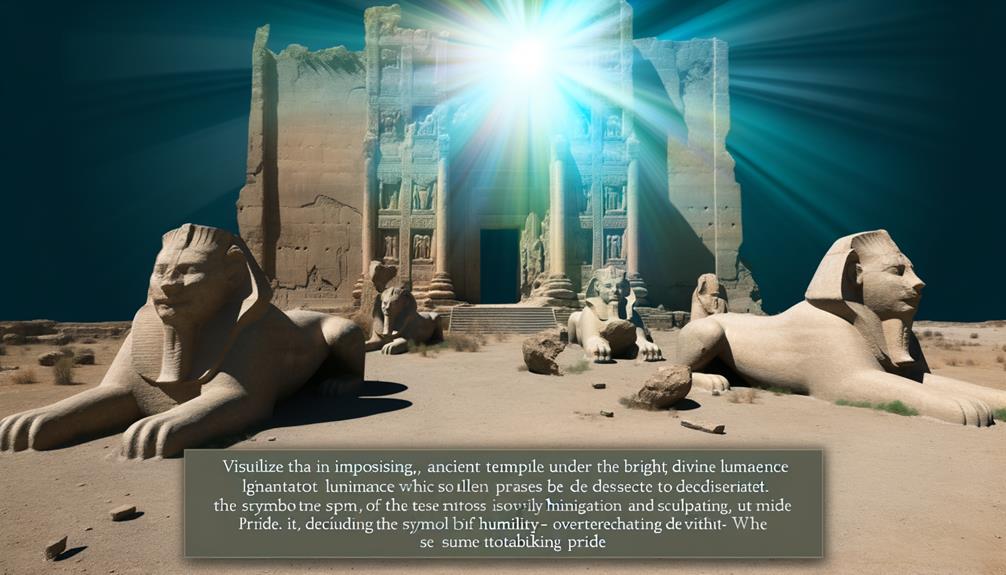Haughty Eyes Bible Verse Meaning: Warning Against Pride
In classic biblical teachings, ‘haughty eyes’ represent a demeanor characterized by pride, arrogance, and self-superiority, which starkly contrasts with the virtues of humility and compassion esteemed in scripture. Key passages such as Proverbs 6:16-19 and Isaiah 2:11-12 highlight ‘haughty eyes’ as part of a transgressive behavior deeply detested by the divine, necessitating humility and reverence as cornerstones of righteous living.
Theologians and scholars expound on how this attitude disrupts social and spiritual harmony, leading to moral decay and divine disdain. Further examination reveals the profound theological implications and transformative lessons embedded in these scriptural admonishments.

Haughty Eyes Meaning in the Bible: Understanding Pride and Humility
| Aspect | Details |
|---|---|
| Key Bible Verses | Proverbs 6:16-17, Proverbs 16:18, James 4:6 |
| Meaning of Haughty Eyes | Symbolizes pride, arrogance, and a sense of superiority over others. |
| Spiritual Warning | Pride leads to separation from God and destruction (Proverbs 16:18). |
| Themes in the Bible | Humility, submission to God, and valuing others above oneself. |
| God’s View of Pride | Pride is listed as one of the seven things the Lord detests (Proverbs 6:16-19). |
| Practical Application | Encourages self-reflection, humility, and seeking God’s grace to overcome pride. |
| Symbolism of Humility | Reflects a heart aligned with God, recognizing His sovereignty and others’ worth. |
Definition of Haughty Eyes

The term ‘haughty eyes’ in biblical literature refers to a proud, disdainful, and arrogant demeanor that looks down upon others. This expression vividly encapsulates an attitude of superiority and self-importance, often manifesting in a person’s gaze or overall countenance.
The concept underscores a moral and spiritual critique, highlighting behaviors that are antithetical to humility and compassion. In theological discourse, ‘haughty eyes’ are frequently examined as a vice that disrupts social harmony and alienates individuals from divine grace.
The term invites a deeper exploration into the ethical dimensions of pride and the inherent dangers of harboring a condescending outlook. Understanding this concept is essential for comprehending broader biblical teachings on humility and righteous conduct.
Biblical References

Examining the biblical references to haughty eyes necessitates an exploration of key scripture passages, such as Proverbs 6:16-19 and Isaiah 2:11-12. These passages highlight the dangers of pride and arrogance, often illustrated through the imagery of haughty eyes as symbols of disdain and superiority. Moreover, understanding this concept can deepen one’s perspective on humility, especially in the context of teachings like the ‘camel and needle biblical interpretation,’ which emphasizes the challenges of entering the kingdom of God when one is ensnared by pride and materialism. By reflecting on these scriptures, individuals can cultivate a more profound awareness of the virtues of humility and the perils of a haughty spirit.
These verses not only illuminate the gravity of pride in the eyes of the Lord but also provide context for interpreting the broader theological implications.
Through this scriptural lens, we gain a deeper understanding of the moral and spiritual admonitions against arrogance.
Key Scripture Passages
Several key scripture passages provide insight into the meaning of haughty eyes in the Bible, highlighting its spiritual implications and moral teachings. These passages underscore the peril of pride and the value placed on humility in scripture.
- Proverbs 6:16-17 – ‘There are six things the Lord hates, seven that are detestable to him: haughty eyes, a lying tongue, hands that shed innocent blood…’
- Proverbs 21:4 – ‘Haughty eyes and a proud heart—the unplowed field of the wicked—produce sin.’
- Isaiah 2:11 – ‘The eyes of the arrogant will be humbled and human pride brought low; the Lord alone will be exalted in that day.’
- Psalm 18:27 – ‘You save the humble but bring low those whose eyes are haughty.’
These verses collectively emphasize the divine abhorrence of arrogance.
Context and Interpretation
Understanding the context and interpretation of biblical references related to haughty eyes necessitates an extensive examination of the cultural, historical, and theological dimensions within which these scriptures were written.
The term ‘haughty eyes’ typically connotes arrogance and pride, attitudes condemned throughout the Bible. Proverbs 6:16-17 explicitly lists ‘haughty eyes’ among the seven abominations to the Lord, reflecting the ancient Near Eastern cultural disdain for prideful behavior.
Historically, such admonitions were directed towards fostering humility and social harmony within the Israelite community.
Theologically, haughty eyes symbolize a heart resistant to divine authority, emphasizing humility as a virtue essential to righteous living.
Insightful interpretation requires balancing these dimensions to fully grasp the profound moral and spiritual teachings embedded in these texts.
Proverbs 6:16-19

Proverbs 6:16-19 enumerates a list of seven vices that are detestable to the Lord, among which is the sin of haughty eyes. This passage underscores the gravity of pride and the destructive nature of arrogance in one’s demeanor.
The seven detestable sins are:
- Haughty eyes – symbolizing arrogance and a condescending attitude.
- A lying tongue – representing deceit and falsehood.
- Hands that shed innocent blood – highlighting the severity of violence and murder.
- A heart that devises wicked schemes – illustrating the premeditation of evil actions.
These vices collectively reflect a broader ethical and moral deviation from divine expectations.
The inclusion of haughty eyes signifies the paramount importance of humility and the rejection of prideful dispositions in one’s spiritual life.
Isaiah 2:11-12

In Isaiah 2:11-12, the prophet conveys a powerful message about the inevitable humbling of the proud, echoing the themes of divine judgment against arrogance as previously highlighted in Proverbs 6:16-19.
Isaiah emphasizes that the lofty looks of man shall be brought low, and the haughtiness of men shall be bowed down, for the Lord alone will be exalted on that day.
This passage underscores the divine prerogative to judge human pride, reflecting a consistent biblical motif where God’s justice confronts human hubris.
The prophetic vision here serves as a sobering reminder of the transient nature of earthly power and the ultimate sovereignty of God, who will assert His majesty over all human pretensions.
Consequences of Arrogance

The Bible frequently underscores the perils of arrogance, cautioning that a haughty spirit precipitates spiritual downfall and estrangement from God.
Such pride not only disrupts one’s relationship with the divine but also sows discord and fractures human relationships.
Consequently, the scriptural admonition serves as a sobering reminder of the profound ramifications of prideful behavior.
Spiritual Downfall Warning
Arrogance, often symbolized by ‘haughty eyes’, is frequently cited in biblical literature as a precursor to spiritual downfall and divine disfavor. The scriptures articulate several consequences of such arrogance:
- Separation from God: Proverbs 16:18 states, ‘Pride goes before destruction, a haughty spirit before a fall,’ emphasizing the inevitable estrangement from divine grace.
- Loss of Wisdom: Pride obstructs spiritual insight, as seen in Proverbs 11:2, ‘When pride comes, then comes disgrace, but with humility comes wisdom.’
- Divine Opposition: James 4:6 asserts, ‘God opposes the proud but shows favor to the humble,’ indicating the divine resistance faced by the arrogant.
- Moral Decay: Arrogance often leads to ethical deterioration, as evidenced by Isaiah 2:11, ‘The eyes of the arrogant will be humbled.’
Understanding these warnings is essential for spiritual growth.
Strained Relationships Impact
Pride-fueled behaviors frequently lead to strained relationships, as individuals exhibiting haughty eyes often alienate those around them due to their perceived superiority. This arrogance creates barriers to genuine connection, fostering an environment of mistrust and resentment.
Such dynamics can be profoundly damaging, as human relationships thrive on mutual respect and humility. The following table illustrates the emotional toll of arrogance:
| Emotional Impact | Relationship Consequence | Long-term Effect |
|---|---|---|
| Isolation | Loss of friendships | Increased loneliness |
| Resentment | Frequent conflicts | Diminished trust |
| Inferiority | Partner withdrawal | Emotional distance |
| Discontent | Family discord | Broken bonds |
Humility in Scripture

Scripture consistently extols the virtue of humility, presenting it as a fundamental quality for those seeking to live a life aligned with divine principles.
Humility is portrayed as a pathway to wisdom, grace, and spiritual elevation. The Bible offers numerous insights into why humility is indispensable:
- Proverbs 11:2 – ‘When pride comes, then comes disgrace, but with humility comes wisdom.’
- James 4:6 – ‘God opposes the proud but shows favor to the humble.’
- Philippians 2:3 – ‘Do nothing out of selfish ambition or vain conceit. Rather, in humility value others above yourselves.’
- 1 Peter 5:6 – ‘Humble yourselves, consequently, under God’s mighty hand, that he may lift you up in due time.’
These verses underscore humility as a cornerstone of righteous living.
Lessons for Believers

Understanding the profound emphasis on humility in the Bible, believers can draw several pivotal lessons to guide their spiritual and moral conduct. First, recognizing the dangers of pride, they are urged to develop a humble heart. Second, believers are encouraged to serve others selflessly, reflecting Christ’s humility. Finally, the importance of seeking God’s wisdom over self-reliance is underscored.
| Biblical Principle | Lesson for Believers | Scripture Reference |
|---|---|---|
| Humility | Develop a humble heart | James 4:6 |
| Service | Serve others selflessly | Philippians 2:3-4 |
| Dependence on God | Seek God’s wisdom | Proverbs 3:5-6 |
In adhering to these principles, believers cultivate a character that aligns with divine teachings and fosters spiritual growth.
Modern-Day Applications

In contemporary society, the biblical exhortations against pride and the call for humility retain profound relevance, influencing both personal conduct and communal interactions. These age-old teachings find modern-day applications in various aspects of life:
- Leadership: Effective leaders prioritize servant leadership, demonstrating humility and empathy, consequently fostering trust and collaboration.
- Workplace: In professional environments, humility encourages teamwork and innovation, contrasting with the divisiveness often caused by arrogance.
- Social Media: Online interactions benefit from humility, discouraging boastful behavior and promoting respectful, constructive dialogue.
- Interpersonal Relationships: Personal relationships thrive when individuals prioritize understanding and respect over self-importance, leading to deeper, more meaningful connections.
These principles, deeply rooted in biblical wisdom, guide individuals in creating a more harmonious and respectful society.
Embracing Humility

Embracing humility involves a conscious and continuous effort to recognize one’s limitations and value the contributions of others, fostering a spirit of mutual respect and growth.
This principle is deeply woven into the fabric of biblical teachings, urging individuals to eschew arrogance and pride. In Proverbs 16:18, the admonition against haughty eyes underscores the peril of self-exaltation.
Humility, by contrast, is a virtue that cultivates a receptive heart and mind, essential for spiritual development. It requires an introspective assessment of one’s actions and attitudes, aligning them with the ethical precepts exemplified by Christ.
In a contemporary context, embracing humility enhances interpersonal relationships and promotes a collaborative environment, ultimately reflecting a life attuned to divine wisdom.
Conclusion
The biblical admonition against haughty eyes serves as a timeless warning against the perils of arrogance.
Through scriptural references and the stark consequences depicted, the message is clear: pride precedes downfall, while humility leads to exaltation.
The teachings of Proverbs and Isaiah underscore the divine disdain for arrogance, urging believers to cultivate humility.
Consequently, the essence of these lessons extends beyond ancient texts, resonating with contemporary life and guiding individuals towards a path of humility and righteousness.






